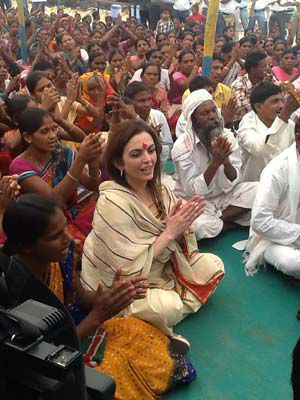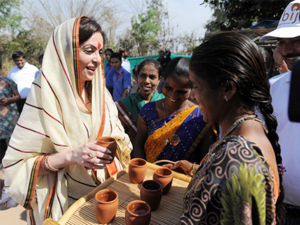Nita Ambani visits Selarpur village in South Gujarat for BIJ initiative of Reliance Foundation
March 13, 2013

Selarpur, Mangrol taluka, South Gujarat, 13 March 2013
Mrs. Nitaben Ambani, first lady of India’s corporate world today during one of her usual visits to connect with the rural marginal communities that she is engaged with through her initiatives in Reliance Foundation said that she will not rest till the efforts result in banishing poverty and marginality from the India that is Bharat. Reliance Foundation has under taken village transformation activities in Netrang cluster under the conceptual programme Bharat India Jodo (BIJ).
Mrs. Nita Ambani interacted the men and women from the local community and inquired about the progress made in the brief association with the Reliance Foundation. She also listened to the villagers about their dreams for future. Mrs. Nita Ambani said that the vision for her flagship initiative under the aegis of the Reliance Foundation is aptly named ‘BIJ’ or Bharat India Jodo, as it is her determination to bridge the divide between the Bharat and India through a holistic transformational initiative.
 Nita Ambani while talking to the community shared that her objective is to bring an aspiration fulfillment of life, and living system for the rural community such as in Selarpur.
Nita Ambani while talking to the community shared that her objective is to bring an aspiration fulfillment of life, and living system for the rural community such as in Selarpur.
While explaining the approach of the Reliance Foundation, she said the primary focus is on securing livelihoods and food security for such communities through revitalizing and de-risking farming. She said it is her belief that this takes much more than resource and technology, and it is actually a matter of passion, commitment and intense engagement with a determination to “Do whatever takes” – which she said is the programme design.
With a goal to develop a model which is self-sustaining, and creating wealth and value, she said the approach equally focuses on building institutions, owned, controlled and run by the community as on the specific interventions like water harvesting, mixed farming, marketing etc.
She outlined the overall Rural Transformation Programme of Reliance Foundation, declaring that in its initial phase 24 amongst poorest pockets of rural India across 10 states of Gujarat; Rajasthan, Madhya Pradesh, Chhattisgarh, Odisha, Jharkhand, Maharashtra, Andhra Pradesh, Karnataka and Tamilnadu are chosen to work in. A modest beginning has been made in engaging with almost 20,000 farming households across over 200 odd villages in these areas. Over 15,000 Hectares of potential land owned by these marginal farmers has been already brought back into productivity.
Nita Ambani declared that her design is simple – It is based on seeking out the community, listening to them and responding to their needs and aspirations. This she says is more critical than any technology and resources for a lasting and meaningful impact. Pace for development can be set only by the community itself, with us being there to support and encourage it. And this is what she said brings her here at such places, to get a first-hand feel, and let that set the agenda for her. She declared the motto for the Reliance Foundation that even for the poorest of the poor, Reliance believes that nothing but the best will do.
An introduction of Reliance Foundation and Bharat India Jodo (BIJ)
 The vision behind this initiative is to make farming the first choice profession. Ms. Nita Mukesh Ambani, Chairperson, Reliance Foundation says “We cannot have Urban India moving ahead at a global pace on the one hand and Rural Bharat on the other, which is left to lag behind”. This has inspired “Reliance Foundation-BIJ”- A Bharat- India Jodo movement, launched in October 2010 as the flagship program of Reliance Foundation to create a scalable model of rural transformation with farming as a primary driving force and is based on the principles of sustainable development. Reliance Foundation-Bharat India Jodo BIJ draws inspiration from the word “bij” meaning “seed” in Hindi – the bearer of infinite energy for generating and sustaining life.
The vision behind this initiative is to make farming the first choice profession. Ms. Nita Mukesh Ambani, Chairperson, Reliance Foundation says “We cannot have Urban India moving ahead at a global pace on the one hand and Rural Bharat on the other, which is left to lag behind”. This has inspired “Reliance Foundation-BIJ”- A Bharat- India Jodo movement, launched in October 2010 as the flagship program of Reliance Foundation to create a scalable model of rural transformation with farming as a primary driving force and is based on the principles of sustainable development. Reliance Foundation-Bharat India Jodo BIJ draws inspiration from the word “bij” meaning “seed” in Hindi – the bearer of infinite energy for generating and sustaining life.
Background of Bharat India Jodo (BIJ)
To understand Bharat and India, it is imperative to identify the fact that a large divide exists between rural Bharat and urban India. To present some facts;
We are the second most populous country in the world nearly 72% of Indians, reside in rural areas, practice farming for sustaining their livelihoods of which nearly 80% live in marginal conditions.
These marginal farmers are generally found in the rain-fed areas of the country which accounts for 57% of net sown area (143m.ha), contributing to 44% of the total food grain produced. But with an average annual income of Rs.25, 000-35,000, the survival of these very marginal farmers is a question, and is forced to migrate.
-An estimate says that nearly 10 million people being affected by seasonal migration every year.
-Statistics such as 300 million malnourished people and 200,000 farmers’ suicides in the last 10 years clearly outline the problems and stress of marginal farmers.
-Farming is becoming economically unviable, stagnant and the last priority for these marginalized families.
 This poses numerous agricultural challenges which need to be addressed.
This poses numerous agricultural challenges which need to be addressed.
-Phasing out of Farming as viable livelihood Choice
-Poverty struck farming communities
-70% of farming is rain-fed
-Highly unpredictable Monsoon
-More than 70% of Rain fed farming comprise of small and marginal farmers
-Marginal and Degraded Lands
-Unorganized and dispersed farming communities with lack of bargaining capacity. Reliability of farming for existence. Increasing External Vulnerability for Farming Traders and middlemen dominance and control of Market.
Reliance Foundation bij’s charter has emerged out with the objective of addressing these challenges:
Key challenges of farming in India:Reliance Foundation-bij’s charter
-Reliance Foundation-bij ensures end to end engagement on value chain with marginal producers/farmers.
-Holistic approach towards marginal farmers by engaging with the entire value chain.
-Door step Services and Support ensured for producers.
-Establish Producer Institution as tool to make true farming communities aspirations. Empowerment of producers and producer institution through ownership and control over the entire production system.
-De-risking farming through Sustainable Agriculture practices.
-Financial & technical support, capacity building and knowledge transfer to improve productivity and predictability in Rain fed areas.
-Market oriented business promotion through Producer Companies, for economic stability and self-reliance. Ensure Economic stability of Producers through market oriented Producer companies.
Reliance Foundation-bij intervention strategy:
 Deviating from the existing models of rural development, Reliance Foundation-bij believes in an end to end engagement with the rural communities which are at marginal level aimed at their empowerment with enhanced access to information, knowledge and equity. The process begins with putting “first thing first”, which in our case are the marginal farmers and their aspirations.
Deviating from the existing models of rural development, Reliance Foundation-bij believes in an end to end engagement with the rural communities which are at marginal level aimed at their empowerment with enhanced access to information, knowledge and equity. The process begins with putting “first thing first”, which in our case are the marginal farmers and their aspirations.
The journey with the marginal farmers begins with:
-Collection and ownership of data at village/habitation level
-Usage of collected data for the purpose of planning by the village community itself
-Helping them organize themselves into institutions through village farmers associations and producer companies
-Ownership of implementation and realization of the benefits
This path of empowerment reaches its destination with the rural communities negotiating with externalities such as market, financial institutions and gaining control over the future. Reliance Foundation-bij partners with the marginal farmers in this journey out of marginality.
Reliance Foundation-bij intervention’s uniqueness lies in its design:
Project location which promotes inclusive growth and equitable development by engaging with the poorest, vulnerable, women and small/ marginal farmers aimed towards mainstreaming them economically and socially.
Visioning: Marginal farmers and their aspirations for their future is the “aadhar or the basis” for the Reliance Foundation-bij interventions. A vision planning done at each of the habitation is the guiding document to design the work plan and development strategy for the village.
 Help at door step: Reliance Foundation-bij’ believes in the wisdom of the marginal farmers and on the need to genuinely listen and learn from the farmers. Reliance Foundation’s team with technical expertise engages with the farmers with a partnership spirit to supplement their efforts.
Help at door step: Reliance Foundation-bij’ believes in the wisdom of the marginal farmers and on the need to genuinely listen and learn from the farmers. Reliance Foundation’s team with technical expertise engages with the farmers with a partnership spirit to supplement their efforts.
Promoting Participatory Institutions: At the heart of the Reliance Foundation-bij initiative is the community driven processes and programmes and formation of institutions like Village Farmers Association and Producers Company which forms the foundation driving the economic and social development agenda.
Sustainable Agriculture: Sustainable agriculture practices form the core of Reliance Foundation-bij interventions in the villages. These include interventions such as DHARTI farms -to improve the productivity of the marginal lands, Reliance Nutritional Garden- to improve the nutritional self sufficiency of farmer family, interventions such as rain water harvesting, construction of earthen and cemented water harvesting structures, promotion of renewable energy sources such as Bio-gas etc.
Present Status
Current picture shows that Reliance Foundation-bij is actively engaged with over 100,000 people from almost 20,000 marginal households in over 250 villages of the 24 project clusters across the 10 States of Madhya Pradesh, Rajasthan, Maharashtra, Gujarat, Odisha, Karnataka, Tamil Nadu, Andhra Pradesh Chhattisgarh and Jharkhand.
Till date about 15000 hectares of privately owned wastelands or underproductive lands have been brought under sustainable agriculture practices. The land based interventions have also contributed to creating 57,82,000 cubic meters (equivalent to 3% water stored in Tansa dam, Maharashtra) of rain water harvesting facility which in turn makes water conservation viable, leading to better standard of living
 Reliance Foundation-bij also aims at nutritional self-sufficiency of the families and has helped in the establishment of around 4000 Reliance Nutritional Gardens (RNG) towards meeting the nutritional requirement of marginal farmers.
Reliance Foundation-bij also aims at nutritional self-sufficiency of the families and has helped in the establishment of around 4000 Reliance Nutritional Gardens (RNG) towards meeting the nutritional requirement of marginal farmers.
This programme is run with the help of over 250 development professionals from diverse educational backgrounds such as social sciences, agriculture, rural development, management, commerce and agriculture engineering have been placed at the different project locations
Further, with a strong belief in garnering and channelizing the energy of the youth for changing the face of marginality in the country a set of 65 young developmental professionals recruited from the premier educational institutes are undergoing a rigorous one year round training program.
Way Forward
The crux of Reliance Foundation-bij is towards achieving transformation of rural India through a process of institutionalization and creation of a sustainable framework for livelihoods. The success of this could help pave the way for replicating the programme on a large scale across India.
Success in Selarpur
One lakh marginal farmers from 250 villages are benefited from Reliance Foundation’s Bharat India Jodo (BIJ) initiative. 72% Indians live in villages and out of them 80% are farmers therefore the Reliance Foundation took a decision to focus on their upliftment. Increase in productivity, more irrigation availability through conservation of rain water, and good market access to farmers were some of the things first thought about under the BIJ initiative.
In Gujarat, the projects have been in implementation in 14 villages of Netrang cluster in south Gujarat and 10 villages of Radhanpur cluster in north Gujarat.
 Marginal farmers mostly are dependent on rain water for farming. As they are not economically sound, they are unable to conserve water or take new initiatives in betterment in their agricultural practices. This adversely affects productivity. India’s 57% agricultural land which provides 44% of total food is in this situation. Such farmers earn only Rs 25-35000 per year, and therefore there is now a question of survival of them. This is major factor responsible for malnutrition among 30 crore people in this nation. In last ten years two lakh farmers have committed suicide.
Marginal farmers mostly are dependent on rain water for farming. As they are not economically sound, they are unable to conserve water or take new initiatives in betterment in their agricultural practices. This adversely affects productivity. India’s 57% agricultural land which provides 44% of total food is in this situation. Such farmers earn only Rs 25-35000 per year, and therefore there is now a question of survival of them. This is major factor responsible for malnutrition among 30 crore people in this nation. In last ten years two lakh farmers have committed suicide.
For upliftment of farmers, Reliance Foundation has implemented BIJ programme in different agro-ecological zones in Gujarat, Rajasthan, Madhya Pradesh, Chhattisgadh, Orissa, Jharkhand, Maharashtra, Andhra Pradesh, Karnataka and Tamil Nadu in 24 clustors covering 250 villages.
Based on the census these villages have been identified as agro-ecological sub regions that are dependent on weather conditions and that have no other NGO working for them. After identifying their agro needs, a 55-day training on agri practices were given apart from organizing farmer mandals and modes of rainwater harvesting.
One of the good examples is Mangrol taluka’s Selarpur village. This village has 35 ha irrigated and 198 ha non-irrigated land. Due to odd topography, rain water flow outside the village. But before a year, Reliance Foundation built walls on the borders of farms and conserved rain water by digging deep. This concept is popularly known as Khet Talavadi. Reliance Foundation encouraged villagers to develop Dhrti farms supported by stored water.
The village people were not growing vegetables in past, and vegetables were not part of their daily food intake. Therefore Reliance Foundation encouraged them to develop Reliance nutrition gardens to grow vegetables. After one years of efforts, number of vegetable growing farms is 66, up from earlier 12. Agri production has seen three times rise. Zinabhai Chaudhary, a farmer of Selarpur says thta earlier five bigha farm would yield 1.5 man(1 man = 20 Kg) Tuver which is now 30 man. Similarly Udad productivity is 15 man now which was earier 5 man.
Earlier only Tuver and Juvar were sawn, but now other crops are also produced. Vegetables grown in the local farms are also supplied to schools to add nutrition in children.
Nita Ambani was welcomed in the village with Kumkum tilak and songs. She sat with the villagers on floor and participated in Sanedo song and dance. Nita Ambani walked through the village under scorching sun and visited Dharti farm and Nutrition garden. She presented LCD TV and computer to this village.
Reliance Foundation has planned its next project under BIJ initiative at Jasdan and Modasa clusters this year. While Jasdan is located in Rajkot district of Saurashtra region, Modasa is located in Sabarkantha district in north Gujarat. The foundations intends to work in 50 villages in Gujarat in another two years investing Rs 15 crore.
Group President of Reliance and Rajya Sabha MP Shri Parimal Nathwani was present during Mrs. Ambani’s visit to Selarpur.
Chairman of Reliance Foundation, Nita Ambani with school children at Selarpur
Related Stories
Nita Ambani visits flood affected families of Patan district, commits Rs 10 crore relief, adoption of villages
Nita Ambani visits Pichavai exhibition in Ahmedabad, Reliance Foundation to buy 700 Pichavai paintings
Nita Ambani most powerful businesswoman in Asia: Forbes
Recent Stories
- Banas Dairy announces hike of Rs. 15 per kg fat of Milk
- Surat Congress candidate Nilesh Kumbhani's nomination form facing invalidation procedure
- ACB Gujarat decoy traps private hospital's staffer for bribery
- Chaitar Vasava has 13 FIRs against him under over 30 IPC sections in 3 police stations
- WR to run 2 pairs of Sabarmati-Barmer Special trains for summer
- ACB Gujarat files offence against SK Langa and son for disproportionate asset
- Kshatriya agitators announce part-2 programs in Gujarat
